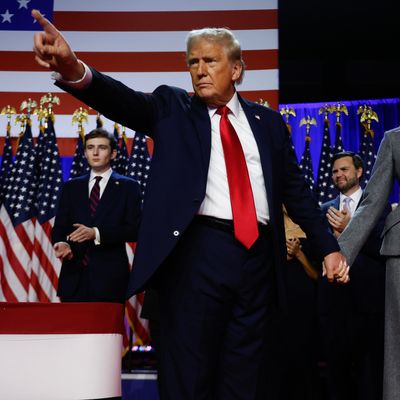
Donald Trump, the twice-impeached, multiply indicted, and once-defeated former president of the United States, overcame 34 felony convictions, accusations of insurrection, civil-lawsuit judgments totaling more than a half-billion dollars, and allegations of dictatorial intentions to win back the White House last night, sweeping aside a last-ditch Democratic candidate switch and a 75-day general-election challenge from Vice-President Kamala Harris to complete his astonishing political comeback and return his populist movement to power.
Two years ago, when Trump declared his 2024 campaign for president, it was broadly greeted as a has-been’s desperation move. (“Florida Man Makes Announcement,” his hometown tabloid the New York Post headlined its story, stuffing the news at the bottom of an inside page.) After his 2020 loss and the January 6 assault, Trump was discredited in the upper precincts of the Republican Party and isolated down in Palm Beach. Even some of his own advisers conceded that Trump’s decision to run was motivated, at least in part, by his desire to politicize — and if possible, escape — the four criminal investigations he faced. He turned the 2024 presidential election into a referendum not just on the country’s direction, but his own freedom, and that double-barreled strategy has now been vindicated.
In the end, Trump got away with it. He now becomes only the second president — and the first since Grover Cleveland in the 19th century — to retake the White House after a reelection defeat. He will return to office emboldened, bound by fewer of the constitutional and institutional checks that he challenged and weakened — but never fully conquered — during his first term in office.
It is worth recounting, at this unsteady historic moment, the long bill of particulars in the legal cases that Trump faced just one year ago. In federal court in Washington, Trump was charged with four felonies related to his efforts to overturn the result of the 2020 election, leading up to the violent assault on the Capitol. In Georgia, he and 18 others, including many top supporters, were charged in a state racketeering case related to their efforts to cast doubt on Joe Biden’s election in that state. In federal court in Florida, Trump was charged with another 37 felonies related to his efforts to retain and hide classified documents after he was ousted from the White House, some of which were seized in an unprecedented FBI search of his mansion at Mar-a-Lago. And in New York City, the place where Trump first made his fortune and became famous, a grand jury indicted him on 34 felony counts of falsification of business records relating to payments of hush money to women during the 2016 campaign. In addition to the criminal indictments, Trump also faced a series of civil trials earlier this year that involved accusations of financial fraud, sexual assault, and serial defamation, which resulted in the catastrophic monetary awards against him. (The civil judgments stand, for now.)
While three of the criminal cases were delayed by Trump’s procedural maneuvers, the New York case went to trial. After five weeks of testimony — much of it embarrassing to the former president, who was repeatedly held in contempt for his bellicose statements outside the courtroom — a jury of New Yorkers pronounced him guilty on all counts. Trump is currently scheduled to be sentenced in that case on November 26, a little less than three weeks from now. In theory, the New York State judge in the case, Justice Juan Merchan, could give him a prison sentence. In reality, there is no chance Trump will be compelled to serve any sentence while he occupies the White House, and he will surely appeal his conviction all the way to the Supreme Court.
That court, which includes three justices appointed by Trump, gave him a favorable ruling earlier this year in the federal January 6 case, which effectively short-circuited a trial before the election. For the long term, the decision broadened the scope of presidential immunity from criminal prosecution and gives Trump constitutional protections that he can invoke during a second term. The classified-documents indictment was also dismissed by a Trump-appointed federal judge in Florida. Trump has promised to fire Special Counsel Jack Smith, the federal prosecutor handling his federal cases, “within two seconds” of taking office. (He has also suggested he might try to expel Smith from the country for good measure, although it’s not clear that even a president has that power.) Trump cannot negate the Georgia prosecution, technically speaking, but that case has collapsed for its own reasons relating to personal indiscretion on the part of Fulton County district attorney Fani Willis.
Trump described all these cases as a campaign of “lawfare,” part of a “deep state” conspiracy that began during his first term, with the FBI’s and Special Counsel Robert Mueller’s investigation of Russian election interference and the Ukraine impeachment inquiry, and intensified after his 2020 defeat. During their four years out of power, veterans of the Trump administration have drawn up plans to assert sweeping power over the federal bureaucracy, and particularly over the Justice Department. Members of the incoming administration now know how to work the levers of the federal government, and they have signaled that they will try to bring the Justice Department and its law-enforcement authority under more direct White House control. It now seems likely that those powers will be turned against those who have attempted to impose legal accountability on Trump and his allies.
Trump has hinted that, as president, he will pardon the many hundreds of his supporters who have been charged and convicted with criminal offenses related to the assault on the Capitol on January 6. Early in this campaign, Trump promised to “totally obliterate” the government institutions that he describes as the “deep state.” “I am your warrior, I am your justice,” he said at his 2023 kickoff rally in Waco, Texas, a location heavy with incendiary symbolism for the far right. “For those who have been wronged and betrayed,” he said, “I am your retribution.” He has repeatedly suggested his version of “retribution” may involve ordering investigations of his perceived legal adversaries — including Smith, Attorney General Merrick Garland, and Biden and his family. In September, Trump suggested that he would also like to see his opponent tried for unspecified offenses, saying Harris “should be impeached and prosecuted for her actions.” He and his supporters have suggested that “they” — without explicitly naming names — were somehow behind the actions of a pair of would-be assassins, one of which only narrowly missed his target when he shot at Trump from a rooftop at a Pennsylvania rally in July.
Over the course of the last two years, the Democrats — led first by President Biden and then, when he proved incapable of continuing his campaign, Harris — issued incessant warnings that a restored Trump would pose a threat to fundamental American values. At the Democratic National Convention in Chicago, speaker after speaker contrasted Harris, “the prosecutor,” with Trump, “the convicted felon.” A yard sign seen all over this country’s liberal precincts read, starkly, “Harris-Walz: Save Democracy.” In 2016, it was possible to wonder whether the electorate chose Trump because of his novelty, celebrity, or the influence of foreign propaganda. After eight exhausting years and a campaign that made plain the stakes as the Democrats saw them, no one can say that Americans are under any illusions. The voters saw the jury’s verdict. They knew who Trump was and the kind of president he would be again. And yesterday, they voted for him anyway.






























